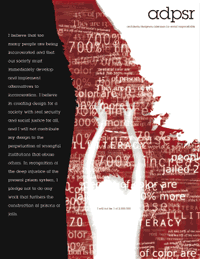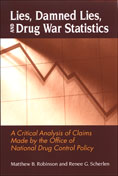A bill to repeal some mandatory minimum sentences in Maryland by restoring parole has gotten further so far than any similar attempt to date. But winning even when our case is the clearest is still a struggle.
Architects are among those who profit from policies that lead to mass incarceration, but one professional grouping is leading a Prison Design Boycott Campaign.
The war on drugs is one part of a web of international crime control regimes that have developed over centuries. But past definitions of crime and today's are not all the same.
An important new book debunks literally years of statistical legerdemain by the nation's central drug policy office -- and is DRCNet's latest premium for our members.
A Georgia fire captain gets caught peddling coke, a pair of New Haven narcs lose their jobs, a former Mississippi police chief cops a plea, and a former Ohio cop goes back to prison.
With the stroke of a pen, Gov. Bill Richardson has made New Mexico the 12th medical marijuana state.
A New York state man has earned the dubious distinction of being the first person arrested under the federal Combat Meth Epidemic Act, which restricts access to cold medicines containing methamphetamine precursor chemicals.
With Gov. Bill Richardson's signature on the 911 Good Samaritan Act, New Mexico becomes the first state to provide limited immunity from prosecution to people who seek emergency medical treatment for overdose victims.
Acting at the behest of Republican Gov. Charlie Crist, the state of Florida has moved to restore voting rights to most ex-felons.
Past drug use by a presidential candidate is close to the bottom of the list of concerns for voters, a Gallup poll has found.
A Nevada governor's panel on methamphetamine is calling for more money for treatment, prevention, and policing, but lacks even a mention of harm reduction.
The NIDA drug library has been closed for budget reasons. The historic collection of more than 12,000 journal volumes and 8,000 books will be dispersed.
Prison litigation, NPR, MPR, medical marijuana patients, FyR interviews, Bulletin of Cannabis Reform, Alternet, Marc Mauer on the "crime wave," DrugTruth radio, restore federal parole petition, National Drug Court Month.
Events and quotes of note from this week's drug policy events of years past.
Support the cause by featuring automatically-updating Drug War Chronicle and other DRCNet content links on your web site!
A new way for you to receive DRCNet articles -- Drug War Chronicle and more -- is now available.
Three positions are now available at the nation's leading harm reduction organization.
Visit our new web site each day to see a running countdown to the events coming up the soonest, and more.

David Borden
Earlier this week I learned from some colleagues who are doing work in Maryland that a bill to restore parole for second-time drug offenders had been passed by a committee in the state's House of Delegates but was facing an uncertain fate in the Senate. A number of senators on the committee had committed to voting for it, but one more was needed to get the bill to go through and have its chance in the full Assembly. The bulletin listed five senators who were still undecided.
I decided that, even though in absolute terms the number of people on our list identified as being from those five districts would likely be small, it was important to take some action. Mandatory minimum sentencing is one of the great evils of our time. According to a report by the Justice Policy Institute, in 2005 Maryland had 4,900 people incarcerated whose worst offense was a drug offense (though it's not known how many are serving mandatory minimums due to limitations in the available datasets), and Maryland spends the greater part of its correctional budget on incarcerating drug offenders.
Things have gotten a little better recently -- the state is one of only 11 that have fewer prisoners now than four years ago -- but the state's incarceration situation is still a travesty. One or two phone calls could well make the difference for a legislator at the state level. One of our members wrote back to let me know the staffer in his senator's office said that his was the only call they had received about the bill at all. One is better than zero -- we made some impact. How much? No way to really tell.
Going into our political database and checking off the names of those five undecided senators, looking to see who we had in their districts, had the effect of making me think. It made me wonder why anyone would not want to restore parole to these people. After all, it's not even legalization or decriminalization. I fervently want for more people to understand the deleterious consequences of prohibition so we can end it, but that's not on the table this year. These are nonviolent offenders. In parole, the Board considers a person's conduct while incarcerated and a range of other factors before deciding whether to give him or her a second chance. I don't expect everyone to think the way I do on everything to do with drugs and criminal justice. But this one seems so straightforward at this late date when mandatory minimums have been so heavily criticized for so long. No one said this job would be easy. But I had to stop and wonder why the clearest acts of conscience can seem so unclear to so many.
Thursday brought good news on the issue, the bill had passed the committee and the margin was comfortable -- one Republican even supported it. A fight is expected on the floor of the House and the Senate. But in getting this far the bill has gone further than any other mandatory minimum repeal bill in Maryland to date.
Things are gradually getting better -- starting to, anyway.
Look for more alerts from us on this issue, at the federal level, over the coming months.
back to top
In the late 1980s and early 1990s, as France embarked on a massive prison-building campaign, working class anarchist revolutionaries fought back by attacking the prison-industrial complex. Naming themselves Os Cangaceiros after the social bandits of the Brazilian northeast in the late 19th and early 20th Centuries, the revolutionaries sabotaged prison construction, published prison blueprints, and physically assaulted architects who designed prisons before being repressed and melting away into the subterranean criminal networks they had established over the previous decades.
Professionals are responsible for their behavior, the revolutionaries argued. In a communique to one prison architect they attacked, they wrote:
Letter to an Architect
Subject: Ambush
Are your wounds well healed, architect? Did you figure out why?
Shamelessly, with no discretion of any kind, centimetre by centimetre, you have conceived these cages in which even the handicapped will be locked up. Inside the walls which you have designed, individuals who are worth more than you will be beaten up on a regular basis. It is good that you have received an appetizer of what thousands of prisoners will endure to the nth degree.
To be sure, architect, this is not your company's first infamy. Considering what you build to house normal citizens, one can guess your competence to shut away delinquents. One moves easily from the tower blocks of the 13th arrondisement to prison cells.
Pig, looking at your snout up close, we were able to note from your tired face how deeply you involve yourself in your projects.
Before you were building walls, now you're going to knock them down.
Os Cangaceiros, Lyon, 29/03/90
Beginning in the 1980s, the US has seen an ever more massive prison boom and a never-ending demand for more prison construction. With the prison and jail population now approaching 2.3 million and steadily increasing, there is no end in sight. And as in France, architects are among those profiting from penal profligacy. But not all members of the profession are willing to "conceive cages."
Architects/Designers/Planners for Social Responsibility (ADPSR) is not a revolutionary anarchist organization, but, as the name suggests, a group of architects and planners interested in social justice issues. Still, ADPSR shares with Os Cangaceiros both the belief that professionals have an obligation to help create a better society and the conviction that mass imprisonment as a solution to social problems is something to be decried, not abetted.

ADPSR poster contest winning entry, by Miguel Bermudez (adpsr.org/prisons/poster.htm)
For the past three years, ADPSR has been working proactively on an effort to get architects, designers, and planners to wash their hands of working on prison projects, the
Prison Design Boycott Campaign. The campaign seeks to get architecural professionals to sign a pledge to "not participate in the design, construction, or renovation of prisons."
Between September 2004, when the campaign started, and January 2006, 500 of the estimated 1,000 to 2,000 architectural and planning professionals who would work on prison design signed the pledge. Now, according to campaign head Raphael Sperry, a San Francisco Bay-area architect, that number is up to 800.
For Sperry and ADPSR, the prison design boycott is part of a larger effort to challenge militarism and violence within American society and the US government. "We have a long history of peace and social justice work dating back to the 1980s," Sperry told Drug War Chronicle. "This campaign had its genesis in the war with Iraq. For us, the war presented us with the issue of militarism, both at home and abroad. With the peace movement so far ineffective, it seemed important to us to challenge this whole mindset at home, where people can see it on a day to day basis, and prisons are one of the biggest social justice failings of our country these days," he said.
"We are calling for an end to the expansion of the prison-industrial complex as a first step," Sperry continued. "We also want to see reinvestment in communities to provide for public safety and we want community-based alternatives to incarceration to solve problems and reduce crime."
ADPSR specifically targets the war on drugs. "The war on drugs is one of the biggest components of the rise of mass incarceration, and the drug laws and drug policy is one of the biggest problems in our criminal justice system today," Sperry said. "We use incarceration instead of treatment. That's not solving the problem, just pushing it behind the walls."

ADPSR poster contest runner-up entry, by William Arbizu & Kerstin Vogdes (adpsr.org/prisons/poster.htm)
While the campaign has yet to prevent any prisons from being built, it has raised awareness of the issue in the professional community. The campaign has been covered in numerous professional publications, correctional industry publications, and the mainstream press, and it has led to debate within the industry's primary professional organizations, such as the American Institute of Architecture and the American Planning Association.
"We have gotten a lot of attention from architects who design prisons," said Sperry. "Even many of them share and appreciate our understanding of the flaws of the criminal justice system. Raising awareness is really important because it can provide us with real room for legislative reform on criminal justice issues like sentencing and drug policy. With this campaign, we hope to add another noisy voice to those already calling for reform."
With about one-third of planners working for various government agencies, reaching them with the campaign message is a tactical goal. "These are the people who put together future prison population projections and do the planning used to create mass incarceration. Every year, they just say "we're going to need more prisons," instead of arguing for policy decisions to reduce the number of prisoner," Sperry noted.
It's not just architects and planners who have embraced the Prison Design Boycott. It has been endorsed by a number of criminal justice reform groups, including the anti-prison activists of Critical Resistance, the Justice Policy Institute, which seeks to end over-reliance on incarceration, and the November Coalition, which focuses on drug war prisoners.
"We embraced the architects' efforts early on because we agree with them that there are too many people in prison and it's essential to expand our movement," said the November Coalition's Tom Murlowski. "Architects and planners are part of the infrastructure of the prison-industrial complex, and we are very pleased to see this organization challenge the profession on this," he told the Chronicle.

ADPSR poster contest finalist entry, by Allison Colley (adpsr.org/prisons/poster.htm)
"We are working on parallel lines here. We've recently launched
No New Prisons, a web site about how to stop prisons in your own communities, including examples for activists of how it's been done, like we successfully stopped the new prison here in Stevens County, Washington," Murlowski said.
While the campaign may not prevent prisons from being built, the project will advance the cause in various ways, said Sperry. "Look, if 99% of architects signed the pledge, there would still be that 1% willing to do the work, but at the level of political acceptability, if we reach a point where a majority of architects are saying the government shouldn't even embark on building new prisons, that says something. Architects are licensed by the state and have a responsibility to protect the public health, safety, and welfare, so if they are saying building prisons does not contribute to a safe public environment, that's a strong public statement," he said.
"There are a lot of young architects who say they didn't become architects to lock people up," Sperry concluded. "I hear stories of the partners in firms going after those contracts, but the young people didn't want to work on prisons. There was an internal resistance, but not a coordinated movement, so we thought we could make a public statement and make it more targeted."
The campaign pledge is not just for architecture, design, and planning professionals. Sperry and the Prison Design Boycott Campaign want anyone who understands and agrees with their position to sign the pledge on their web site.
While the methods of Os Cangaceiros may have a certain outlaw appeal, we're happy to see the architects themselves trying to take matters in hand instead.
back to top
The academic discipline of international relations pays little heed to crime control and the academic discipline of criminal justice pays little heed to international politics, note Peter Andreas and Ethan Nadelmann early in "Policing the Globe." That has left a lacunae they have nicely filled in their study of the rise of international cooperation in policing -- and where it might go from here.
You couldn't come up with a better pair to tackle this subject than Andreas and Nadelmann. Andreas, a professor of political science and international relations at Brown University, has done extensive work on the US-Mexico border. And I assume most readers are familiar with Nadelmann as head of the
Drug Policy Alliance, where he serves as the country's most prominent drug reform advocate. But in addition to being an activist, Nadelmann is an academic with a long interest in the internationalization of crime control. In fact, he laid much of the groundwork for "Policing the Globe" with his 1993 "Cops Across Borders," published by Penn State University Press.
As an academic work, "Policing the Globe," while eminently readable (unlike some academic prose), is likely to be mostly read by serious researchers and students of its subject matter. That's a shame, for Andreas and Nadelmann shed considerable light on the evolution of the ever-more-integrated international police apparatus. Given the acceleration of that integration since the attacks of September 2001 and the technological advances leading us ever closer to an Orwellian surveillance society, it might behoove us to pay some attention.
While "Policing the Globe" is not indecipherable academic-speak, it is dense. But it is also chewy. It's the kind of writing where you start out underlining the really important parts, but quickly find you have to switch to quick slash-marks on the page margins because otherwise you're going to underline half the damn book.
The rise of international cooperation in crime control is because of the rise of international crime, right? Seems reasonable, but as Andreas and Nadelmann explain, it's not quite that simple. It has instead been a process lasting hundreds of years, beginning with efforts to eradicate piracy and slavery, and moving through the attempt by European states to suppress political opponents, the crusade against international prostitution, the war on drugs, and now, the war on terror.
And the liberal model of a police response to a crime problem doesn't explain it. In fact, it begs the question: What is a criminal activity and why? The most vivid examples of international police cooperation and global prohibition regimes revolve around activities that weren't even crimes a century ago: drug trafficking and use, money laundering, the traffic in migrant humans, and political violence (or terrorism, which presents its own sticky definitional and political problems).
To really explain the rise of international crime control, argue Andreas and Nadelmann, one must also incorporate some realpolitik and some social constructivism into the mix. In realpolitik, stronger states impose their wills on weaker ones, and the pair show how that has been the case here. At the beginning, cooperation among European states paved the way, but in the past century, and especially since World War II, the United States, as the most powerful state actor, has been largely able to impose its criminal justice preferences on the rest of the world. To the extent it has been able to do that, it has made international criminal law more homogenous, more in line with that of its own.
But American preferences are determined not just by economics, politics, or national security, but also by appeals to morality and the fight against evil. Indeed, what the authors call "transnational moral entrepreneurs" have played a key role in the creation of the global slavery, white slavery, and drug prohibition regimes. If we want to understand global criminality, we have to understand how it is created.
Andreas and Nadelmann spend the middle section of "Policing the Globe" carefully describing the evolution of international crime control. In sometimes exhausting detail, they note the rise of international cooperation against European anarchist assassins and other political "criminals," and their gradual displacement as the primary creators of the international crime consensus by the Americans. Now, the DEA and the FBI have offices in dozens of countries across the world.
And where will we go from here? Global drug prohibition is likely to hang around despite its failures and collateral damage, the pair predict. "The failure of a global prohibition regime does not necessarily signal its future demise," they write. Instead, its "symbolic allure" as a means of moral disapproval is likely to ensure that it continues. "Open defection from the regime is highly unlikely any time soon."
But they do point to some nibbling around the edges. The global consensus on marijuana is crumbling, they note, and the rise of coca-friendly Evo Morales to the Bolivian presidency could lead to erosion of the UN Single Convention prohibition on the coca plant, or even a direct challenge to the convention itself.
But "Policing the Globe" is larger than the drug war, and it raises serious concerns about the broader implications of what could be the coming global police state (my words, not theirs). All in all, Andreas and Nadelmann have produced an important work, one that should be essential for anyone interested in global policing. Given some of the trends the pair identify, however, this book should probably be required reading for anyone interested in the preservation of freedom in the 21st Century.
back to top
Normally when we publish a book review in our
Drug War Chronicle newsletter, it gets readers but is not among the top stories visited on the site. Recently we saw a big exception to that rule when more than 2,700 of you read our review of the new book Lies, Damned Lies, and Drug War Statistics: A Critical Analysis of Claims Made by the Office of National Drug Control Policy. Much of this reading took place during a week that had other very popular articles as well, so clearly the topic of this book, which was authored by respected academics Matthew Robinson and Renee Scherlen, has struck a chord. As well it should.
Please help DRCNet continue our own work of debunking drug war lies with a generous donation. If your donation is $32 or more, we'll send you a complimentary copy of Robinson and Scherlen's book to help you be able to debunk drug war lies too.
Over the coming weeks I will be blogging on our web site about things I've learned reading Lies, Damn Lies, and Drug War Statistics. Stay tuned!
Your donation will help DRCNet as we advance what we think is an incredible two-year plan to substantially advance drug policy reform and the cause of ending prohibition globally and in the US. Please make a generous donation today to help the cause! I know you will feel the money was well spent after you see what DRCNet has in store. Our online donation form lets you donate by credit card, by PayPal, or to print out a form to send with your check or money order by mail. Please note that contributions to the Drug Reform Coordination Network, our lobbying entity, are not tax-deductible. Tax-deductible donations can be made to DRCNet Foundation, our educational wing. (Choosing a gift like Lies, Damn Lies, and Drug War Statistics will reduce the portion of your donation that you can deduct by the retail cost of the item.) Both groups receive member mail at: DRCNet, P.O. Box 18402, Washington, DC 20036.
Thank you for your support, and hope to hear from you soon.
Sincerely,

David Borden
Executive Director
P.S. You can read Chronicle editor Phil Smith's review of the book here.
back to top
A Georgia fire captain gets caught peddling coke, a pair of New Haven narcs lose their jobs, a former Mississippi police chief cops a plea, and a former Ohio cop goes back to prison. Let's get to it:
In Fayette, Georgia, a Fulton County Fire Department captain was arrested March 29 for selling powder cocaine to undercover drug agents. Captain Bruce Bostwick, 56, faces one count of cocaine distribution. He got caught peddling the drug at a north Fulton County gas station.
In New Haven, Connecticut, city police commissioners voted Wednesday to fire narcotics officers arrested last month. Lt. William White, who was head of the narcotics unit, and Detective Justen Kasperzyk were fired on the recommendation of Police Chief Francisco Ortiz. White is charged with stealing $30,000 he thought was drug money, but was actually bait planted by the FBI. Kasperzyk is charged with stealing less than $1,000 in FBI bait money. Since the pair's arrests, New Haven officials disbanded the drug squad and handed over some of its cases to state police.
In Greenville, Mississippi, a former small town police chief pled guilty Monday to two federal drug counts. Former Ripley Police Chief Bert Contely copped a plea to possession of marijuana with intent to distribute and distribution of hydrocodone. He faces up to 10 years in prison and a $500,000 fine. Conely resigned as chief after his indictment and arrest in March.
In Youngstown, Ohio, a former Mahoning County Sheriff's Office lieutenant has been sentenced to four years in prison after pleading guilty to three counts of drug possession and three counts of drug trafficking. Michael "Beef" Terlecky, 51, who left the sheriff's office in 1988, has been in trouble before. He served eight months in federal prison for taking bribes from organized crime figures. This time, Terlecky went down for selling more than 200 Oxycontin tablets in a series of buys with undercover officers. The possession charges stemmed from what police found in his home when they raided it as he was being arrested.
back to top
New Mexico Gov. Bill Richardson (D) Monday signed into law a bill making the state the 12th to approve the medicinal use of marijuana. Richardson is a candidate for the Democratic Party 2008 presidential nomination. In signing the bill, he becomes the only major contender in either party to publicly endorse the medicinal use of marijuana.

Gov. Bill Richardson signing a bill into law
The
Lynn and Erin Compassionate Use Act, named after patients Lynn Pierson and Erin Armstrong, allows people who live with certain serious, chronic conditions to use and possess marijuana with a doctor's recommendation. But in a departure from the normal practice in other states, where patients or designated caregivers are allowed to grow their own medicine, the New Mexico law stipulates that only producers licensed by the state Health Department may grow medical marijuana.
The bill came only after being denied House floor votes in two previous sessions and after apparently being defeated this session. But thanks to strong lobbying by Richardson and groups like the Drug Policy Alliance New Mexico office, it passed on a second, last-minute vote.
"This law will provide much-needed relief for New Mexicans suffering from debilitating diseases," said Gov.Richardson in a signing statement. "It is the right thing to do. I'm proud to sign legislation that makes patient care an important priority in this state," Richardson said. "It is time for Congress and the federal government to follow our lead and help those forced to endure painful, chronic diseases."
"By signing this bill, Gov. Richardson is showing his compassion for seriously ill people, and he is also reflecting the will of the majority of New Mexicans and the American people," said Reena Szczepanski, director of the Drug Policy Alliance New Mexico in a Monday statement. "I hope that other elected officials take note: Americans will stand behind those that believe in compassion and mercy for our most vulnerable, our sick and dying patients struggling for relief."
New Mexico now joins Alaska, Arizona, California, Colorado, Hawaii, Maine, Montana, Nevada, Oregon, Vermont and Washington as states that have approved medical marijuana.
back to top
An Ontario, New York, man last Friday won the dubious distinction of being the first person arrested under the 2005 Combat Meth Epidemic Act. According to a DEA press release, William Fousse was arrested for purchasing cold tablets containing more than nine grams of pseudoephedrine within a one month period.

Busted for Bronkaid
Under the Combat Meth Act, passed with little scrutiny when it was attached to a bill renewing provisions of the Patriot Act, chemicals widely used as cold remedies or other non-prescription medicines that can also be used in home meth manufacture, such as ephedrine, pseudoephedrine, and phenylpropanolamine, are now "scheduled listed chemical products."
Products containing these chemicals are now kept behind the counter. In order to purchase them, one must show identification and sign a log book at pharmacies. DEA and state and local law enforcement monitor those logbooks to see if anyone is buying amounts over the limit.
"This is a first for DEA," crowed DEA Western New York Special Agent in Charge John Gilbride. "DEA's focus is to dismantle clandestine methamphetamine labs and trafficking organizations and to also monitor the products that are illegally used to produce methamphetamine. DEA is committed to keeping our communities safe from the dangers of methamphetamine production and abuse. Today's arrest is a warning to those who violate the Combat Methamphetamine Epidemic Act."
Fousse is alleged to have purchased more than 400 Bronkaid tablets containing a total of more than 29 grams of ephedrine during the month of January -- more than three times the legal limit -- at one pharmacy and to have purchased a like amount at two others. It was a call from the first pharmacist to the DEA's Buffalo office that set the wheels in motion.
DEA agents visited Fousse at his home on February 13. According to a police affidavit, Fousse said he was unaware of the law, was not selling the pills to meth cooks, and was using the stuff himself. That was not good enough for the DEA and federal prosecutors. He faces a May 1 court date.
back to top
New Mexico Gov. Bill Richardson (D) Wednesday signed innovative legislation that would protect friends or family members who seek medical attention for drug overdose victims. The law is the first of its kind in the country.
Too often, the companions of drug overdose victims fail to seek medical attention for them for fear of being arrested and prosecuted themselves. The 911 Good Samaritan Act (SB 200) seeks to encourage people to get help by providing limited immunity from drug possession charges when an overdose victim or friend seeks emergency medical services.
With nearly an overdose death a day, New Mexico has the highest drug overdose death rate in the nation. Six years ago, the state passed legislation removing criminal liability from people who prescribe the opiate reversal agent naloxone. That move is credited with saving hundreds of lives. This new law should save even more.
The measure was pushed by the Drug Policy Alliance New Mexico affiliate. "By signing this legislation, the Governor is sending a clear message to New Mexicans: don't be afraid to seek medical help. This is definitely the next step in reducing the overwhelming number of preventable overdose deaths in New Mexico," said Reena Szczepanski, the group's New Mexico director in a Wednesday statement.
back to top
Nearly five million ex-felons nationwide are banned from voting, but that number will shrink by around 600,000 because the state of Florida has decided to let most of its felons easily regain their rights. The move came Thursday, when Gov. Charlie Crist (R) persuaded the state's clemency board that it was time to "leave the ranks of offensive states" that uniformly bar ex-offenders from voting.
Up until now, Florida felons who had completed their sentences had to undergo a lengthy and torturous process to regain their civil rights. But now, all except convicted murderers, sexual predators, and "violent career criminals" will automatically regain those rights. That means up to 80% of an estimated 950,000 disenfranchised Floridians will be able to vote.
The decision came on a 3-1 vote by the clemency board. The only dissenter was notorious drug warrior and former US representative Bill McCollum.
Now, only Kentucky and Virginia automatically and uniformly deny voting rights to ex-felons.
back to top
Only 17% of Democratic voters and 22% of Republican voters would refuse to vote for a presidential candidate who has admitted to past drug use, a Gallup poll has found. Overall, only 19% of voters would reject a candidate because he smoked a bowl or snorted a line in the distant past, the survey found.

It didn't stop Bill Clinton from getting elected.
The poll, conducted late last month, asked more than 1,000 respondents what qualities they were seeking in the next president. Concern about candidates' past drug use ranked only 13th out of 16 questions about candidates' qualities, scoring higher than only "attends religious services regularly" (18%), "has worked in Washington a long time" (10%), and "has served in the military" (7%).
Potential voters were much more concerned that candidates are strong leaders (77%), have good moral character (68%), are effective managers (63%), can unite the country (59%), and are consistent on the issues (47%).
That's good news for Democratic contender Barack Obama, who has publicly admitted to past drug use. The news isn't so good for possible Republican contender Newt Gingrich, who recently admitted to carrying on extramarital affairs. Being faithful to one's spouse is considered absolutely essential by 37% of potential voters, including 52% of Republican voters.
back to top
A panel appointed by Nevada Gov. Jim Gibbons to study responses to methamphetamine use, manufacture, and trafficking in the state called last Friday for more treatment, more prevention, more police, and more laws restricting precursor chemicals, but rejected a bill that would have increased penalties for meth offenses. In its Preliminary Report, the Governor's Working Group on Methamphetamine Use warned that while home meth lab busts are down, Nevada is first in the nation in per capita lifetime meth use, past year meth use, and past month meth use.

not great, but could have been worse
The Working Group mainly focused on how to allocate some $17 million dollars allocated in the governor's executive budget for addressing amphetamine. It recommended that some of the money go to replace lost federal grants for community anti-drug coalitions and to state education programs, that funding be made available to address substantial waiting lists for drug treatment and to address co-occurring disorders, and "increased funding to hire additional law enforcement officers to be placed on existing and new task forces across the state."
The group also made recommendations about specific methamphetamine-related legislation before the legislature. It supported one bill, AB 148 that would impose state-level restrictions on the sale of meth precursors, but rejected a harsher one, AB 150, that would have required a prescription to obtain cold medications containing drugs like pseudoephedrine. It also rejected two measures that would have ratcheted up sentencing. The first, AB 116, would have reduced the amount of meth needed to trigger trafficking charges from four grams to three, while the other, AB 281 would have made possession of the tiniest trace of any Schedule I drug except marijuana a potential trafficking offense.
While the panel recommended restraining legislators' efforts to pile-on the meth penalties, it did not mention harm reduction and discussion of alternatives to drug prohibition were clearly not on the agenda. That is not surprising, given the panel's make-up, which included seven law enforcement officials, four elected officials, the head of the Department of Health and Human Services, a health care executive, a school superintendent, a newspaper publisher, and the governor's wife. No harm reductionists or apparent past or present methamphetamine users were represented.
back to top
The National Institute on Drug Abuse's (NIDA) massive collection of journals and books related to drug use and addiction has been shut down because of budget cuts, according to the organ of the Substance Abuse Librarians and Information Specialists, SALIS News. The fate of the 12,000 journal volumes and 8,000 books in the collection is unclear at this point, but it will likely be scattered between the National Institute of Health, other drug and addiction collections, and the personal libraries of researchers.
While the collection was used primarily by NIDA staff, it also contains many historic documents. The collection dates back to 1929 and includes every article published by program staff since NIDA's predecessor, the Addiction Research Center, was founded in 1935. Also among the holdings are the entire set of the Committee on Problems of Drug Dependence meetings abstracts/minutes since its inception in 1929, and numerous other government documents and materials only found in such special collections.
NIDA gets over a billion dollars a year to conduct research on drug abuse and addiction, but it can't seem to find the money to keep this resource going. As the SALIS News noted: "What will this mean in the long term for those who had relied on [the NIDA Library] for the information they sought? Will it be just a few clicks on Google for them to find the information? What about the history of this research unit so long a part of the early drug addiction research in America? And gee, I thought drug abuse was supposed to be one of the major problems in America."
back to top
Preserving the Rule of Law in America's Prisons: The Case for Amending the Prison Litigation Reform Act, report from the American Constitution Society for Law and Policy
Deep in the Colombian Jungle, Coca Still Thrives, National Public Radio
Minnesota Public Radio on Assessing the War on Drugs
Loretta Nall asks readers to help medical marijuana patient Don Prockup
Devil Weed: Dark Shadow of Ignorance Hangs Over Bernie's Farm, by Tribune Media Services editor and nationally syndicated columnist Robert Koehler
Bulletin of Cannabis Reform, issue #3, March 2007
Right to Treatment: Fire Survivor Takes on County's Marijuana Position, San Diego CityBeat on medical marijuana patient Rudy Reyes
New York is Hell for Pot Smokers, NORML's Paul Armentano for Alternet
What Wave? Sentencing Project's Marc Mauer on the alleged crime wave and get-tough policies, American Prospect
local cable TV interview with Flex Your Rights staff, posted on YouTube
Cultural Baggage for 03/30/07: Deborah Small of Break the Chains and Ex Warden Rich Watkins (MP3)
Century of Lies for 03/30/07: Cliff Thornton of Efficacy, Phil Jackson and Drug War Facts (MP3)
petition for restoring federal parole
May will be National Drug Court Month
back to top
April 8, 1989: Miguel Angel Felix Gallardo is arrested in Mexico. Guillermo Gonzalez Calderoni leads a team of Federal agents who arrest the drug lord in a residential suburb of Guadalajara. Gallardo is imprisoned on charges relating to the kidnapping and murder of Enrique Camarena. His nephews, the Arellano-Felix brothers, inherit part of his drug-trafficking empire.
April 6, 1995: ABC News airs a special entitled "America's War on Drugs: Searching for Solutions" in which legalization is presented as an alternative to the failing war on drugs.
April 11, 1997: Graham Boyd, an ACLU attorney representing a group of plaintiffs including eleven prominent cancer and AIDS physicians in San Francisco, presents to a federal judge the following statement: "The federal government has issued broad threats against physicians who might recommend marijuana to some of their seriously ill patients. These threats have gagged physicians and have impeded the responsible practice of medicine. We assert that doctors have the right to discuss medical marijuana with patients, and we are seeking clear guidelines for physicians who wish to do so."
April 6, 1998: Dr. Dennis Rosenbaum's six year study of 1,798 students, "Assessing the Effects of School-based Drug Education: A Six Year Multilevel Analysis of Project DARE," finds that "DARE had no long-term effects on a wide range of drug use measures," that DARE does not "prevent drug use at the stage in adolescent development when drugs become available and widely used, namely during the high school years," and that "DARE may actually be counterproductive."
April 7, 1999: A Village Voice article, "Truth or D.A.R.E.: the Dubious Drug-Education Program Takes New York," informs readers that "More than a dozen studies have concluded that DARE has no lasting impact. And one six-year study found increased drug use among suburban kids who graduated from DARE."
April 6, 2000: The First National Clinical Conference on Cannabis Therapeutics convenes at the University of Iowa.
April 9, 2002: NORML launches a $500,000 campaign featuring bus shelter signs and telephone booth posters carrying a quote from New York City Mayor Michael Bloomberg, who when asked whether he had ever tried marijuana said, "You bet I did. And I enjoyed it." NORML used Bloomberg as the centerpiece of its campaign to urge the city to stop arresting and jailing people for smoking marijuana. "Millions of people smoke marijuana today. They come from all walks of life, and that includes your own mayor," said NORML Executive Director Keith Stroup.
April 12, 2002: Canada's Toronto Sun reports that a recent report sites Ontario's indoor marijuana industry as the third largest agricultural sector in the province, a $1-billion industry surpassed by dairy's $1.3 billion and beef cattle's $1.2 billion. Add to that the multi-millions being harvested from outdoor crops and marijuana cultivation in this province moves into the top spot on the list.
April 8, 2003: The US House of Representatives Government Reform's Subcommittee on Criminal Justice, Drug Policy, and Human Resources holds a hearing on the High Intensity Drug Trafficking Areas and Counterdrug Technology Assessment programs because, as Subcommittee Chairman Souder stated, "HIDTA has reached far beyond its intended focus on national drug trafficking. We will need to consider how best to streamline and increase accountability within the HIDTA program."
April 10, 2003: In the wake of the federal conviction of medical marijuana grower Ed Rosenthal, US Rep. Sam Farr (D-CA) and 27 other members of Congress introduce H.R. 1717 (the "Truth in Trials Act").
back to top
Are you a fan of DRCNet, and do you have a web site you'd like to use to spread the word more forcefully than a single link to our site can achieve? We are pleased to announce that DRCNet content syndication feeds are now available. Whether your readers' interest is in-depth reporting as in Drug War Chronicle, the ongoing commentary in our blogs, or info on specific drug war subtopics, we are now able to provide customizable code for you to paste into appropriate spots on your blog or web site to run automatically updating links to DRCNet educational content.
For example, if you're a big fan of Drug War Chronicle and you think your readers would benefit from it, you can have the latest issue's headlines, or a portion of them, automatically show up and refresh when each new issue comes out.
If your site is devoted to marijuana policy, you can run our topical archive, featuring links to every item we post to our site about marijuana -- Chronicle articles, blog posts, event listings, outside news links, more. The same for harm reduction, asset forfeiture, drug trade violence, needle exchange programs, Canada, ballot initiatives, roughly a hundred different topics we are now tracking on an ongoing basis. (Visit the Chronicle main page, right-hand column, to see the complete current list.)
If you're especially into our new Speakeasy blog section, new content coming out every day dealing with all the issues, you can run links to those posts or to subsections of the Speakeasy.
Click here to view a sample of what is available -- please note that the length, the look and other details of how it will appear on your site can be customized to match your needs and preferences.
Please also note that we will be happy to make additional permutations of our content available to you upon request (though we cannot promise immediate fulfillment of such requests as the timing will in many cases depend on the availability of our web site designer). Visit our Site Map page to see what is currently available -- any RSS feed made available there is also available as a javascript feed for your web site (along with the Chronicle feed which is not showing up yet but which you can find on the feeds page linked above). Feel free to try out our automatic feed generator, online here.
Contact us for assistance or to let us know what you are running and where. And thank you in advance for your support.
back to top
RSS feeds are the wave of the future -- and DRCNet now offers them! The latest Drug War Chronicle issue is now available using RSS at http://stopthedrugwar.org/chronicle/feed online.
We have many other RSS feeds available as well, following about a hundred different drug policy subtopics that we began tracking since the relaunch of our web site this summer -- indexing not only Drug War Chronicle articles but also Speakeasy blog posts, event listings, outside news links and more -- and for our daily blog postings and the different subtracks of them. Visit our Site Map page to peruse the full set.
Thank you for tuning in to DRCNet and drug policy reform!
back to top
The Harm Reduction Coalition is hiring a Harm Reduction Community Organizer (Los Angeles), Director of Finance (New York) and Los Angeles and Director of Operations (Oakland).
Harm Reduction Community Organizer:
The Harm Reduction Coalition (HRC), a progressive advocacy and training organization at the forefront of national health and drug policy, is seeking a highly-motivated Community Organizer to reduce the barriers to harm reduction in LA. Must be able to organize within coalitions and networks to advocate for policy change, implementation and funding. Position will involve project-based work for HRC campaigns through March 2008, with a strong possibility for further employment.
The Coordinator will research and analyze advocacy needs; facilitate strategic planning processes; conduct policy research and written analyses; organize coalition work; plan and deliver needed training and capacity-building; and mobilize active drug users and service providers in self-advocacy efforts.
This position requires an organized, self-motivated person with at least three years of experience in community organizing and leading advocacy campaigns. Excellent written and verbal communication skills and proven ability to identify and act upon key opportunities are a must. Desired skills are: media experience, consensus-building, knowledge of LA harm reduction community, use and maintain contact databases, experience in designing and delivering training, grantwriting & reporting.
Salary $52-55,000 DOE, with health benefits. To apply, send a detailed cover letter describing your interest in position, resume, and writing sample by email to [email protected]. This position will be hired quickly; please apply as soon as possible.
HRC is an Equal Opportunity Employer. People of Color, women, people living with HIV and history of drug use are encouraged to apply.
Director of Finance
The Harm Reduction Coalition, a progressive advocacy and training organization at the forefront of national health and drug policy with over $2.5 million budget, seeks a full-time Director of Finance to join its diverse and growing staff. Successful candidates must have a minimum of five years' experience in nonprofit financial management with expertise in Quickbooks or a similar accounting program. Responsibilities include: overseeing financial systems for bookkeeping, budgeting, accounting and timely reporting; monitoring budget to actual expenses; managing near and long-term cash flow; overseeing audit preparation and implementation; reporting to private and government funders; managing risk, liability and contracting. Start immediately. Salary low 60s. Fax resume and cover letter to Search Committee at 212-213-6582. No phone calls please.
The Harm Reduction Coalition is an Equal Opportunity Employer. People of color, women, and people living with HIV are encouraged to apply.
Operations Manager
The Harm Reduction Coalition (HRC), a progressive advocacy and training organization at the forefront of national health and drug policy, is seeking an operations manager responsible for all administrative functions of HRC/HRTI operations including tech support, client company relations, facilities, finance, data entry, filing, and event logistics.
Requires strong computer skills and an understanding and commitment to a harm reduction approach. Also calls for flexibility, excellent interpersonal skills, sense of humor, and the ability to work well in a team.
Salary $32,000, with health benefits. To apply, send a detailed cover letter describing your interest in position and resume by email to [email protected].
HRC is an Equal Opportunity Employer. People of Color, women, people living with HIV and history of drug use are encouraged to apply.
back to top
With the launch of our new web site, The Reformer's Calendar no longer appears as part of the Drug War Chronicle newsletter but is instead maintained as a section of our new web site:
- Visit http://stopthedrugwar.org each day and you'll see a listing of upcoming events in the page's righthand column with the number of days remaining until the next several events coming up and a link to more.
- Check our new online calendar section at to view all of them by month, week or a range of different views.
- We request and invite you to submit your event listings directly on our web site. Note that our new system allows you to post not only a short description as we currently do, but also the entire text of your announcement.
The Reformer's Calendar publishes events large and small of interest to drug policy reformers around the world. Whether it's a major international conference, a demonstration bringing together people from around the region or a forum at the local college, we want to know so we can let others know, too.
But we need your help to keep the calendar current, so please make sure to contact us and don't assume that we already know about the event or that we'll hear about it from someone else, because that doesn't always happen.
We look forward to apprising you of more new features on our web site as they become available.
back to top











